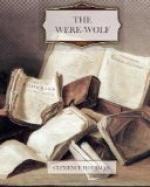Nor was she a woman to be wooed otherwise. Tender whispers and sighs would never gain her ear; but her eyes would brighten and shine if she heard of a brave feat, and her prompt hand in sympathy fall swiftly on the axe-haft and clasp it hard. That movement ever fired Sweyn’s admiration anew; he watched for it, strove to elicit it, and glowed when it came. Wonderful and beautiful was that wrist, slender and steel-strong; also the smooth shapely hand, that curved so fast and firm, ready to deal instant death.
Desiring to feel the pressure of these hands, this bold lover schemed with palpable directness, proposing that she should hear how their hunting songs were sung, with a chorus that signalled hands to be clasped. So his splendid voice gave the verses, and, as the chorus was taken up, he claimed her hands, and, even through the easy grip, felt, as he desired, the strength that was latent, and the vigour that quickened the very fingertips, as the song fired her, and her voice was caught out of her by the rhythmic swell, and rang clear on the top of the closing surge.
Afterwards she sang alone. For contrast, or in the pride of swaying moods by her voice, she chose a mournful song that drifted along in a minor chant, sad as a wind that dirges:
“Oh, let me go!
Around spin wreaths of snow;
The dark earth sleeps below.
“Far up the plain
Moans on a voice of pain:
‘Where shall my babe be lain?’
“In my white breast
Lay the sweet life to rest!
Lay, where it can lie best!
“’Hush! hush its cries!
Dense night is on the skies:
Two stars are in thine eyes.’
“Come, babe, away!
But lie thou till dawn be grey,
Who must be dead by day.
“This cannot last;
But, ere the sickening blast,
All sorrow shall be past;
“And kings shall be
Low bending at thy knee,
Worshipping life from thee.
“For men long sore
To hope of what’s before,—
To leave the things of yore.
“Mine, and not thine,
How deep their jewels shine!
Peace laps thy head, not mine.”
Old Trella came tottering from her corner, shaken to additional palsy by an aroused memory. She strained her dim eyes towards the singer, and then bent her head, that the one ear yet sensible to sound might avail of every note. At the close, groping forward, she murmured with the high-pitched quaver of old age:
“So she sang, my Thora; my last and brightest. What is she like, she whose voice is like my dead Thora’s? Are her eyes blue?”
“Blue as the sky.”
“So were my Thora’s! Is her hair fair, and in plaits to the waist?” “Even so,” answered White Fell herself, and met the advancing hands with her own, and guided them to corroborate her words by touch.
“Like my dead Thora’s,” repeated the old woman; and then her trembling hands rested on the fur-clad shoulders, and she bent forward and kissed the smooth fair face that White Fell upturned, nothing loth, to receive and return the caress.




